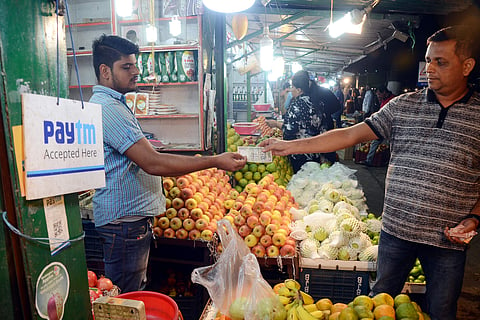

BHUBANESWAR: Shankar Sahu was the first vendor at Shriya Square fruit vending zone to have opened an account in Paytm, a week after Prime Minister Narendra Modi announced demonetisation of high-value currency notes and appealed for less-cash transactions last year.
He was happy to have the facility as he could do some business, which was hit hard due to shortage of cash, through digital and commerce platform while many of his fellow vendors were struggling to make a few hundred rupees a day.
Later Sahu upgraded to PoS machine expecting more transactions but exactly a year after ‘notebandi’ Sahu he is no more excited about the digital payments. He did brisk business through Paytm till January, after that he doesn’t remember when he had last used the digital mode of transaction.
“While people do not prefer Paytm transactions now, I discourage them for PoS as the bank charges two percent on the amount transacted. If customers are paying in cash why would we ask for online payments? We are offering cashless facility to those who express that they do not have cash but want to purchase in bulk,” he said.
Even as the Centre claims that demonetisation is a success in the country, Modi’s dream for a less-cash society seems to have hit a roadblock with a majority of people returning back to the cash transaction.
The initial enthusiasm for cashless transactions faded in a few months after the availability of cash in banks and ATMs. Though people in urban and semi-urban areas prefer for digital payments for high-value purchases which were the practice even before demonetisation, the cashless economy is still a dream in rural areas which constitutes 80 percent of the State’s population.
Poor internet connectivity in semi-urban and rural areas and easy availability of cash in banks and ATMs have also prompted people to return to cash transactions. A retired banker Dipankar Ghosh said though initially awareness campaigns were conducted to make people conversant with the cashless transaction and aware that cashless transactions are free of service charges, the drive lost steam later.
A section of people, however, argued in favour of ‘notebandi’ claiming that the outcome of demonetisation showed people are ready to accept change for reforms in the economy. “Demonetisation also created an acceptance and awareness about the digital channel among the public at large which will bear fruit in future,” said Sumanta Das, an IT professional.
The business community in most of the rural areas alleged that the PoS devices are lying unused on account of poor connectivity. The transactions could not be completed most of the time as the devices are encountering problems due to poor connectivity, which they claimed, forced them to return to cash transactions.